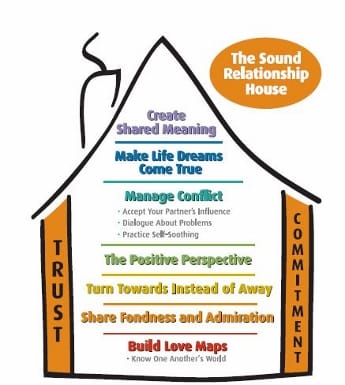Min’an and I started to attend couple’s therapy. We notice that we frequently get stuck on the same topics of discussion. Usually, these topics such as the child, money and future desires invite many heated arguments. We wonder if there is a better way to talk about these sensitive topics.
I think the reason of going to a couple’s therapy is similar to the logic of meditation practice. The quality of your life is determined by the quality of your minds, and to a large extent, by the quality of your relationship.
While meditation and personal therapy are beneficial to get to know your mind well, their usefulness is limited when discussing relationships.
When we began the therapy, the therapist recommended using the Gottman couple therapy, which includes three assessments sessions and a survey that each of us had to fill up.
The first session is together, about 1.5 hours, setting up the presenting problem in the relationship.
The second session is separate, one hour each with the same therapist, one after another.
The third session is together, about 1.5 hours, setting up a common achievable goal for the therapy.
The survey to be filled is rather long, but it was nice to have a tangible way to cover something so vague as interpersonal relationships. The result was never quantified or disclosed to each other, and only the therapist knew the complete answers. I think the survey was created to cover the most common conflict areas. It can include more complicated cases such as domestic violence and drug abuse.
This Gottman method is based on the Sound Relationship House Theory.

Its description from Wikipedia:
- Building love maps - This refers to enhancing how well one knows their partner.
- Nurturing fondness and admiration in the relationship.
- Turning towards each other - This involves being aware of a partner’s needs and responding to their bids for connection.
- Creating a positive perspective - This is when the couple looks for the best in each other rather than rushing to criticism.
- Managing conflict - Managing conflict is when you take into consideration your partner’s feelings and emotions. Another aspect of conflict management is continual dialogue to ensure resolution. When feeling heated during arguments, it is important to self-soothe by doing something to get your mind off the issue at hand.
- Making life dreams come true - It is important to be with someone who is trying to inspire you to reach your goals.
- Creating shared meaning - This is when couples start to have rituals, traditions, and symbols that you share together.
- Weight-bearing wall - Cultivating trust in the relationship.
- Weight-bearing wall - Cultivating commitment in the relationship.
What is nice about this is that managing conflict is at the heart of the framework. It makes me feel that when we have conflict, we can progress and move forward by choosing to grow the relationship rather than being fearful of it, thereby avoiding the conflict.
We started the assessment period in October, and we have been happy with the progress. The therapist taught us things like four steps on how to listen. The framework is simple to describe but incredibly hard to do with honesty and authenticity.
The quality of your closest relationships determines the quality of your life. The pain is a sign of the opportunity for us to grow.